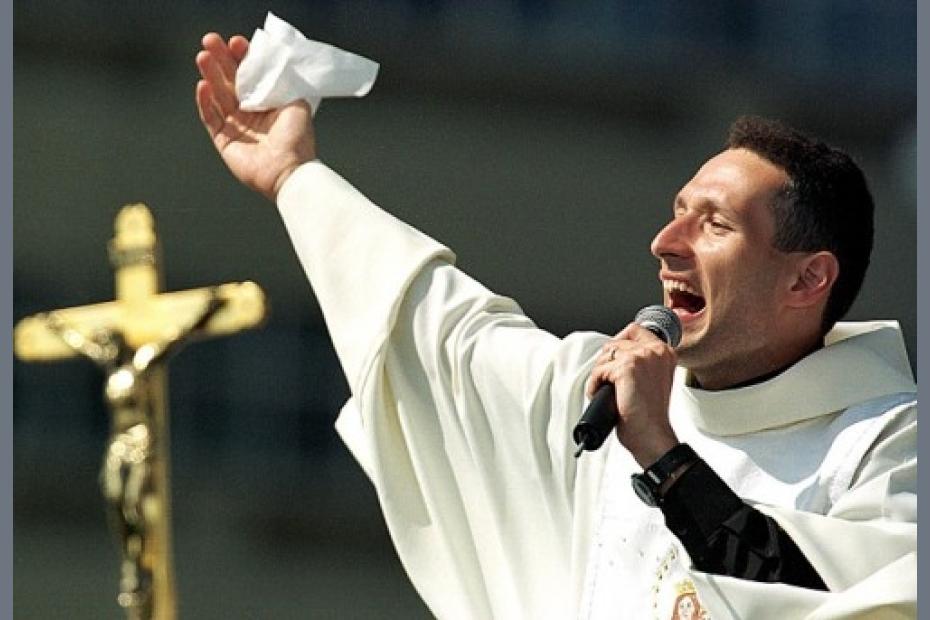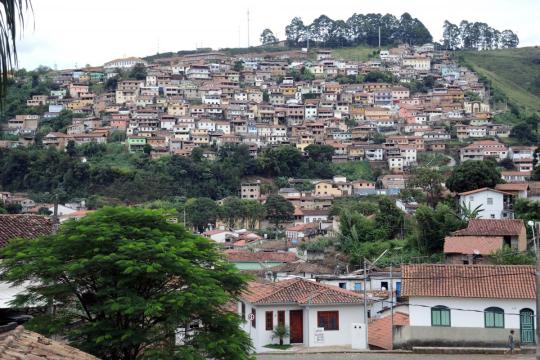Important as the story of a Catholic exodus to Pentecostalism has been in Brazil in the last few decades, the more relevant story, in numerical terms, may be the degree to which Catholicism has been reshaped by Pentecostalism, leaving something new – charismatic Catholicism – in its wake.1 According to a 2006 survey, one half of Brazilian Catholics are charismatic.2 Influenced by the Protestant Pentecostal tradition, Charismatic Catholics are believers who have undergone some experience of being "born again," focus intensely on the bible as a source of authority in their lives, are much more likely to say that they experience divine intervention and revelations in their daily lives, and prefer worship in a more charismatic style.
Charismatic forms of worship tend to be ecstatic in form, often incorporating contemporary music, waving of hands and emotionally charged preaching. In its original form, Charismatic worship is non-liturgical, focusing instead on bible readings, preaching, witnessing to Christ, singing, and healing by laying on of hands. Worshipers ask to be filled with the Holy Spirit in visible, tangible ways, even by speaking in tongues. Some charismatic Catholics participate both at liturgy and at more charismatic forms of worship, while others find ways to integrate the style of charismatic worship into the liturgy.
Charismatic Catholicism is manifest in local and mass-media settings. Small charismatic prayer groups, which flourish in 2/3 of Brazilian parishes, are vital to the movement, which has also spread through radio, television and Christian-themed popular music. Churches like Canção Nova (New Song) in Southern Brazil are said to draw 60,000 worshipers each Sunday. The Catholic television network Redevida broadcasts on more than 500 stations.
Charismatic Catholicism is nationally visible in the persons, music and concerts of a number of celebrity singing priests.3 Padre Marcelo Rossi, the biggest star among them today, is a Grammy award winner who has occupied the top of the sales charts in Brazil. He has built a mega church in São Paulo where weekly attendance is about 190,000 people.
In Brazil, at least, it would be a mistake to see Pentecostalism and charismatic Catholicism as identical. This difference is clear in terms of practice – charismatic Catholics weave Pentecostal and Catholic liturgical and devotional practices together in ways Pentecostals reject – but it is also true in terms of beliefs. While Pentecostals tend to assert that all of scripture should be interpreted literally, charismatic Catholics in Brazil tend far less often to be literalist. Only 14% say the services they attend frequently include tangible “signs of the spirit” – speaking in tongues, healings, and prophesy – compared to 67% of Pentecostals. 16% say they ever personally speak or pray in tongues, compared to 50% of Pentecostals; 31% have witnessed or experienced a divine healing, compared to 77% of Pentecostals; 13% read scripture daily, compared to 51% of Pentecostals; 32% attend church at least once a week, compared to 86% of Pentecostals; 28% have received a revelation, compared to 64% of Pentecostals; 30% have witnessed or experienced an exorcism, compared to 80% of Pentecostals; 15% participate in a bible or religious education group at least once a week, compared to 59% of Pentecostals. Catholic charismatics are a little more likely than other Catholics to access religious media, but still far less so than Pentecostals.4
In terms of belief, only about half of charismatic Catholics interpret the Bible literally;5
32% believe that miracles still occur today as in ancient times, compared to 55% of Pentecostals; 31% believe they have a duty to convert people of other religious faiths, compared to 72% of Pentecostals. In terms of sexual mores, Charismatic Catholics appear to be much more permissive on homosexuality (regarded by 54% as at least sometimes justified) and extramarital sex (regarded by 74% as at least sometimes justified) than Pentecostals. 6
Pentecostalism and charismatic faith are often tied to a prosperity gospel, a belief that God will materially reward believers who have enough faith. In Brazil, 83% of Pentecostals believe that to be true. Charismatic Christians, the vast majority of whom are Catholic, are less likely to agree (61%), and interestingly are also less likely than other non-Pentecostal Christians to agree with the prosperity gospel. But to confound some of the standard narratives, while Charismatic Catholics appear to be less likely (72%) than other Catholics (78%) to agree that believers “have a duty to work for justice for the poor,” compared to 87% of Pentecostals who felt such obligation.7
In short, by all of these measures, Charismatic Catholics seem to have much more in common with fellow Catholics who are not Pentecostal than with Christians who are – yet still describe themselves as charismatic. More research needs to be done to determine just what they mean by this.
- 1 This is the central thesis of Edward L. Cleary, The Rise of Charismatic Catholicism in Latin America, (Gainesville: University Press of Florida, 2011). Cleary traces the origins of the movement from the 1970s onward, and is one of the best sources in English on the subject.
- 2 Luis Lugo and Andrew Kohut, "Spirit and Power: A 10-Country Survey of Pentecostals," The Pew Forum On Religion & Public Life (2006): 76, accessed August 29, 2013, http://www.pewforum.org/files/2006/10/pentecostals-08.pdf.
- 3 For a summary of the singing priest phenomenon in Brazil, see Edward L. Cleary, "Brazil: Superstar and Competition with Pentecostals," in The Rise of Charismatic Catholicism in Latin America, (Gainesville: University Press of Florida, 2011), 132-151.
- 4Luis Lugo and Andrew Kohut, "Spirit and Power: A 10-Country Survey of Pentecostals," The Pew Forum On Religion & Public Life (2006): 15-29, accessed August 29, 2013, http://www.pewforum.org/files/2006/10/pentecostals-08.pdf. The survey does not separate out charismatic Catholics, but charismatic Catholics do constitute the vast majority of people who fit under the “charismatic but not Pentecostal” umbrella in Brazil.
- 5 Luis Lugo and Andrew Kohut, "Spirit and Power: A 10-Country Survey of Pentecostals," The Pew Forum On Religion & Public Life (2006): 25, accessed August 29, 2013, http://www.pewforum.org/files/2006/10/pentecostals-08.pdf.
- 6 Luis Lugo and Andrew Kohut, "Spirit and Power: A 10-Country Survey of Pentecostals," The Pew Forum On Religion & Public Life (2006): 42, accessed August 29, 2013, http://www.pewforum.org/files/2006/10/pentecostals-08.pdf. The survey does not separate out charismatic Catholics, but charismatic Catholics do constitute the vast majority of people who fit under the “charismatic but not Pentecostal” umbrella in Brazil.
- 7Luis Lugo and Andrew Kohut, "Spirit and Power: A 10-Country Survey of Pentecostals," The Pew Forum On Religion & Public Life (2006): 30-31, accessed August 29, 2013, http://www.pewforum.org/files/2006/10/pentecostals-08.pdf.

